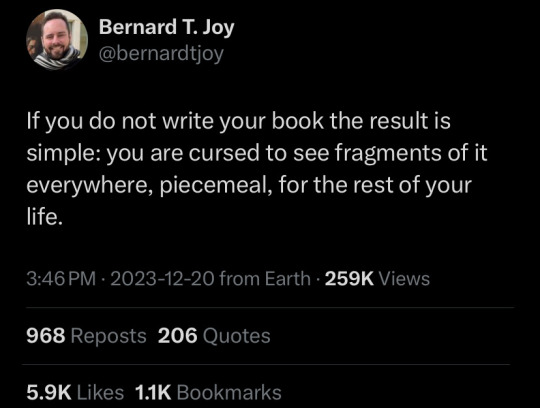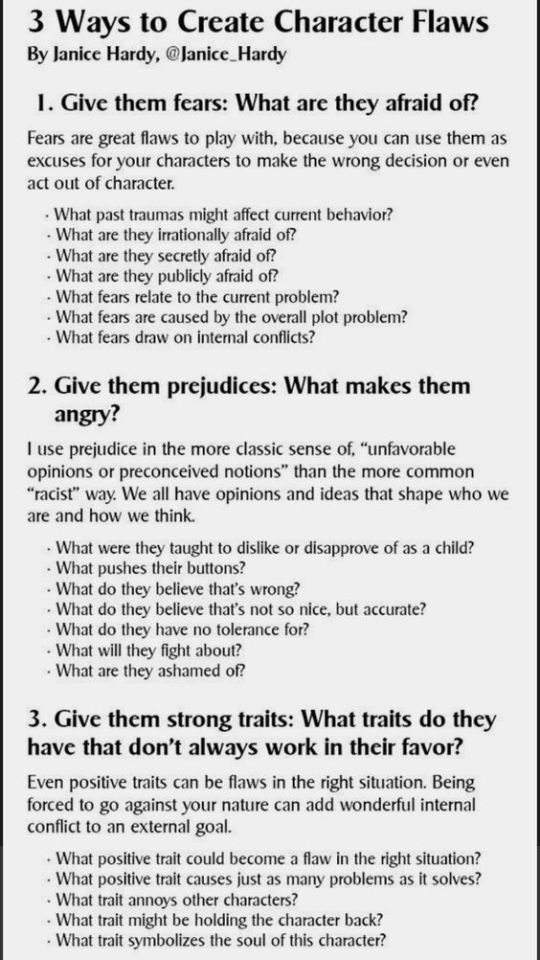Text
still so obsessed w the empty gaping hole characters that never actually appear in the story leave like god. you can see the shape of them
25K notes
·
View notes
Text
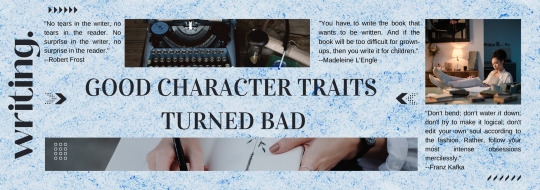
🪽😈Good Traits to bad
Our perfect imperfections make us imperfect perfections.
Nice <> passive/unassertive
Strong-willed <> stubborn
Sensitive <> easily upset
Honest/communicative/trustworthy <> insensitive/brutal
Loyal/devoted/faithful <> tolerates bad behaviour from others
Perfectionism <> Never beign satisifed
Generosity <> Being taken advantage of
Being dependable <> People always depending on them
Protectivenss <> Overprotective, obsessive
Cautiousness <> Never risking anything
Ambitiousness <> Coming off as ruthless
Tidiness <> Obsessive and compulsive
Assertiveness <> Coming off as bossy
Pride <> Not accepting help
Being realistic <> Being seen as pessimistic
Innocence <> Being seen as naive
Optimism <> Not realistic
Diligent <> not able to bend rules
If you like my blog, buy me a coffee☕ and find me on instagram! 📸
🖱️References
https://townsvillepsychologist.com.au/personality-traits-can-be-positive-and-negative/
https://www.pinterest.com/pin/9359111719786856/
3K notes
·
View notes
Text
life's too short to write for an imaginary critic that you fear will hate what you wrote
19K notes
·
View notes
Text
really love dynamics that are like 'it honestly doesn't matter if you view them as romantic or platonic, the point is that they love each other. the type of love is inconsequential, all that matters is that it's there'. gotta be one of my favorite genders.
59K notes
·
View notes
Text
How to get to know your characters better?
(feel free to add your own thoughts to this list, hope it helps!) req by @miricalebabyy44 <3
what will your character be like if they were in your shoes?
is your oc the mom friend or the dad or the childish one in their friendgroup ?
do those "poet, king, soldier" quiz for your oc. im being fr
do the "36 questions to fall in love" quiz as your oc.
ik your ocs trauma have an impact on their character, but how would they be like, if they hadn't gone through that experience?
does your oc have similar tastes as you do? (music, art, fashion, coffee/tea etctetc)
will they "i only live once so I'll do it for the plot." or will they "i only live once ffs, i don't wanna die." ?
what is your ocs opinion of love? how is/was their love life on a scale of 1-10?
will your oc let go of someone precious to them when they know they're putting them at danger?
around whom does your oc lets their guard down?
are they romantically constipated or a hopeless romantic?
what type of music does ur oc like?
write a lot about your oc if you're struggling to get to know them. find a drabble prompt, and write what they'd do.
do they trust others easily or do they get trusted by others easily?
what is something your oc will never talk to anyone about? (their answer can be deep, like some emo trauma or like smthng like back when they shit their pants or smthng yk)
do they give off golden retriever energy, or a black cat energy? (or both?)
what will THEIR opinion be on YOUR current life? will they be ur friend? will they trust you?
will your oc survive in a fantasy setting, a war setting, a dystopian setting, a futuristic setting, a medieval setting? will ur oc survive after getting stranded on an island, or a forest?
does your oc like their parents, do they like how their life is, do they feel like they're born in the right gen?
if they are ever to get one wish definitely granted, what would they wish for?
how did they react to their first kiss? (if they have had it by now lmao)
what's an ideal day for your oc?
lastly, who does your oc go to when they've fucked up?
8K notes
·
View notes
Text
extensive list of character traits
hello hello, it's me! here's an extensive list of traits. note: if you're developing a character, check out this free workbook which has a complete character sheet :D
good character traits:
understanding
courageous
tenacious
resourceful
confident
diligent
persevering
empathetic
caring
respectful
patient
dependable
trustworthy
adaptable
charismatic
creative
innovative
encouraging
gracious
forgiving
generous
inquisitive
knowledgeable
modest
noble
optimistic
passionate
practical
principled
reliable
self-disciplined
selfless
strong-willed
thoughtful
wise
assertive
bold
decisive
dignified
disciplined
enthusiastic
faithful
friendly
humorous
imaginative
insightful
intuitive
open-minded
persuasive
practical
proactive
rational
self-confident
self-sufficient
sensible
sympathetic
tactful
team player
trusting
unassuming
visionary
well-rounded
bad character traits:
self-centered
rude
disrespectful
impulsive
greedy
arrogant
dishonest
manipulative
lazy
stubborn
moody
pessimistic
judgmental
aggressive
reckless
inconsiderate
paranoid
insecure
materialistic
irrational
vengeful
deceitful
disloyal
boastful
closed-minded
condescending
impatient
intolerant
narcissistic
obsessive
possessive
short-tempered
sneaky
suspicious
unpredictable
unreliable
wasteful
weak-willed
withdrawn
agonizing
cynical
possessive
aloof
intimidating
sadistic
bitter
passive-aggressive
evasive
procrastinating
irritable
dismissive
disrespectful
confrontational
overbearing
domineering
pompous
biased
inflexible
impetuous
misanthropic
overcritical
arrogant
hope this was useful! have a nice day <3
1K notes
·
View notes
Text
Are your characters too “perfect”? Struggling to give them negative traits?
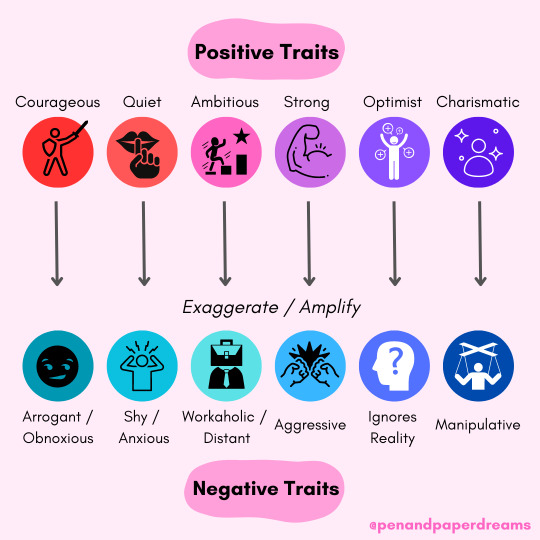
I’ve definitely fallen into the trap of making my protagonists and side characters too “perfect” before. It’s an easy mistake to make, but it can lead to your characters feeling one-dimensional if you’re too afraid to make them seem morally grey.
Here’s a very simple method:
1. Take a character’s main positive trait. Let’s take Hermione Granger, for example - her intelligence is a defining aspect of her character.
2. Exaggerate it into a negative trait. In the instance of Hermione Granger, she can come across to the other characters as a know-it-all. She’s not always portrayed as perfect for her intelligence, which is what makes her character more interesting.
Using this method, we have a number of options for negative traits for an intelligent character - patronising, arrogant, smug - to name a few.
I use the Fatal Attraction theory for this, which suggests that we fall out of love with someone for the same reason we were initially attracted to them. So, if you grew to like someone because you liked how strong and dominant they are, you may become tired of that down the line when their behaviour is controlling.
I’ve illustrated a few examples for how to exaggerate common positive traits into negative ones in the image above, but I have a few more examples to share so you really get the idea:
Keep reading
730 notes
·
View notes
Text
Character flaws
It's been a while since I wrote this post, so I'm a bit lazy to retype it.
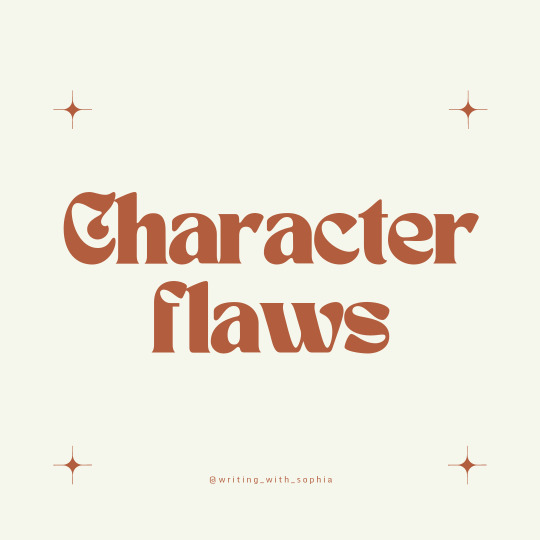
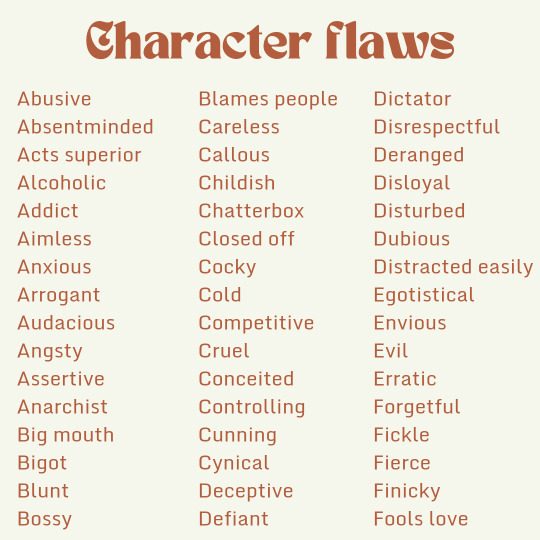
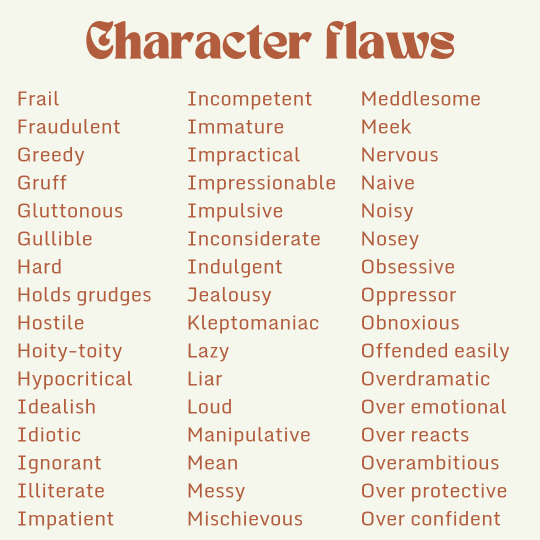
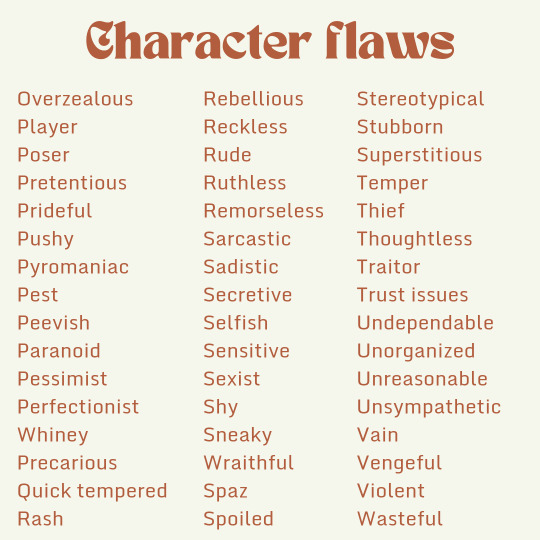
If you want to read more posts about writing, please click here and give me a follow!

1K notes
·
View notes
Text
things to ask yourself when designing a female character:
how much blood is she covered in
are her eyes filled with madness
can she rip things to shreds with her fingernails
22K notes
·
View notes
Text
writing and craft and stuff
"Mia do you have any writing advice pet peeves"
why, yes i do. presented without too much comment:

it's a scam because you need to use both things to tell a story effectively. if it's all show, your novel is going to be over 200k words and half of it will probably be a travelogue. if it's all tell, we'll have a hard time getting into the characters' thoughts and feelings. show, don't tell exists to help newer writers explore what's going in their characters' minds. it's not a hard and fast rule once you've learned how to characterize and give context. so please, do some telling. do some beautiful telling.
8K notes
·
View notes
Text
How not to Start your Story!
When starting your story, it's important to captivate readers right from the beginning. Here are some quick tips on what to avoid when starting your story:
1. Avoid excessive backstory: Starting with a lengthy exposition or an information dump about the history or background of the world or characters can be overwhelming for readers. Instead, focus on engaging them with the present situation and reveal necessary details gradually.
2. Don't start with clichés: Opening your story with clichéd phrases or situations can make it feel unoriginal and uninspiring. Try to find a unique and fresh angle to grab readers' attention.
3. Avoid excessive description: Starting with long paragraphs of detailed description can slow down the pacing and lose readers' interest. Begin with action, dialogue, or a compelling scene to draw readers in and sprinkle in descriptions throughout the story.
4. Don't introduce too many characters at once: Introducing a large cast of characters right from the beginning can confuse readers and make it challenging to form a connection. Start with a focused introduction to the main characters and gradually introduce others as the story progresses.
5. Avoid starting with a dream sequence: Beginning your story with a dream sequence can be disorienting and disconnect readers from the main narrative. Save dreams or flashbacks for later in the story when they have more relevance and impact.
6. Don't start with overly vague or abstract language: Using cryptic or ambiguous language at the beginning may leave readers feeling confused and disengaged. Provide enough concrete details and context to give readers a sense of time, place, and characters.
7. Avoid starting with too much action: While action can be exciting, starting with a high-intensity scene without proper context can leave readers feeling disoriented. Provide enough information to ground readers and establish the setting before diving into intense action sequences.
8. Don't begin with excessive dialogue: Opening with a long conversation without sufficient context can be confusing and fail to engage readers. Set the scene and introduce characters before diving into extended dialogue exchanges.
9. Avoid lengthy prologues: Starting with a prologue that is disconnected from the main story or too lengthy can deter readers. Make sure the prologue serves a clear purpose and immediately captures readers' interest.
10. Don't start with a long internal monologue: Beginning with an extended internal monologue can be overwhelming and distance readers from the story. Instead, focus on action or interaction to create a more engaging start.
Remember, a strong opening sets the tone for your story and hooks readers' attention. Consider starting with a compelling scene, intriguing question, or an intriguing character to captivate readers from the first sentence.
Happy writing!
1K notes
·
View notes
Text
Female characters who are the sole voice of reason <<<<<<< Female characters who think of themselves as the sole voice of reason but who are actually just as insane as those around them
46K notes
·
View notes
Text
Character flaws that can add depth and complexity to your characters:
1. Stubbornness: A character who is excessively stubborn may refuse to listen to others' perspectives or admit when they're wrong, leading to conflicts and missed opportunities for growth.
2. Impulsiveness: An impulsive character acts without thinking, often leading to hasty decisions or reckless behavior that can have negative consequences.
3. Jealousy: A character plagued by jealousy may struggle with feelings of insecurity and possessiveness, causing strain in relationships and potential conflicts with others.
4. Indecisiveness: An indecisive character finds it difficult to make choices, leading to delays, missed opportunities, and frustration from others.
5. Arrogance: An arrogant character believes they are superior to others and often dismisses or belittles those around them, creating tension and damaged relationships.
6. Insecurity: A character with deep-seated insecurity may constantly seek validation and struggle with self-doubt, impacting their decisions and relationships.
7. Impatience: An impatient character lacks tolerance for delays or setbacks, which can lead to rushed actions, poor judgment, and strained relationships.
8. Manipulativeness: A manipulative character uses deceit and manipulation to control others for their own gain, creating a web of lies and mistrust.
9. Hot-tempered: A hot-tempered character easily becomes angry or loses their temper, leading to impulsive actions, damaged relationships, and potential violence.
10. Perfectionism: A perfectionistic character sets impossibly high standards for themselves and others, often leading to stress, frustration, and strained relationships.
11. Distrust: A character with trust issues struggles to trust others, leading to difficulty forming meaningful connections and maintaining healthy relationships.
12. Procrastination: A character who frequently procrastinates avoids tasks or responsibilities, causing unnecessary stress and potential negative consequences.
13. Selfishness: A selfish character prioritizes their own needs and desires above others, disregarding the feelings and well-being of those around them.
14. Pessimism: A pessimistic character constantly expects the worst outcome, which can lead to negativity, lack of motivation, and strained relationships.
15. Impulsiveness: An impulsive character acts on their immediate desires without considering the consequences, often leading to reckless behavior and regrets.
flaws make characters more relatable and human. They create internal and external conflicts and provide opportunities for growth and development throughout your story.
Happy writing!
3K notes
·
View notes
Text
“Tell the readers a story! Because without a story, you are merely using words to prove you can string them together in logical sentences.”
— Anne McCaffrey
266 notes
·
View notes
